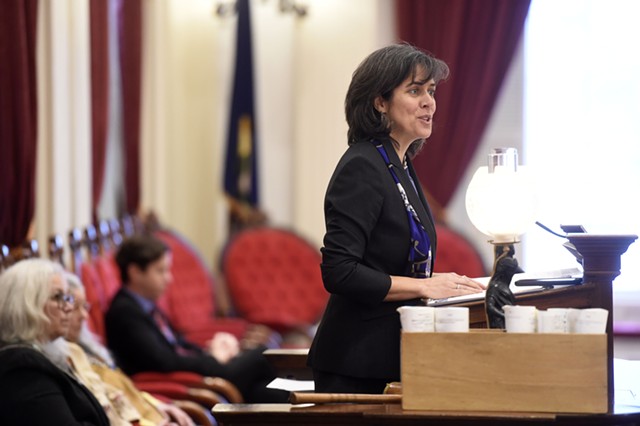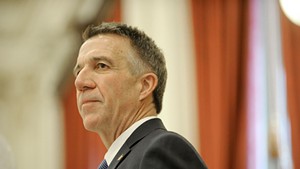
- Jeb Wallace-Brodeur
- Speaker Mitzi Johnson (D-South Hero)
Updated 3:52 p.m.
Vermont House lawmakers voted 100-49 Tuesday to override Gov. Phil Scott’s veto of a minimum wage increase, handing Democratic leaders a razor-thin and much-needed legislative win.
With the Senate voting last week to override the Republican governor’s veto, the bill now becomes law, having achieved the two-thirds majority necessary in the 150-member House. It will hike the current minimum wage of $10.96 per hour to $11.75 in 2021 and to $12.55 in 2022 before increases will again be tied to inflation.
“Today's vote reaffirms the legislature’s commitment to Vermont’s working families,” said House Speaker Mitzi Johnson (D-South Hero) in a statement. House Majority Leader Jill Krowinski (D-Burlington) shared that sentiment.
“This is a really good day for hardworking Vermonters who deserve and need a raise in their wages,” she said.
Scott was far less enthused. In a statement after the vote, he said the legislature had overlooked concerns that he and many lawmakers have expressed about the bill’s potential impact.
“I hope for the sake of our rural communities they are correct,” Scott said of those who voted for the override. “We simply cannot sustain more job losses or closed businesses, particularly outside the greater Burlington area.”
He added that it’s “more important than ever” to now focus on policies that will “actually grow the economy."
Tuesday’s vote marks the first time in more than a decade that the legislature has managed to override a governor’s veto. It wasn’t an easy task.
House leaders passed the minimum wage bill last month with only 93 votes — seven short of the 100 needed to ensure an override. Two lawmakers who missed the first vote had long been expected to support the increase. But a new wrinkle emerged when Rep. Chris Bates (D-Bennington), who initially supported the legislation, shared newfound reservations with VTDigger.org last week.
House leaders looked to the eight members of their own party who had opposed the measure the first time around.
Most of those moderate Democrats shared some of the governor’s concerns. But their decision on Tuesday was whether to allow Scott to again strike down a top party priority. In the end, only two held firm: Reps. Cynthia Browning (D-Arlington) and Charen Fegard (D-Berkshire).
“To not have negative effects on employment, we need to make sure minimum wage increases are moderate and cautious,” Browning said from the House floor. The current proposal, she said, is “too much too soon.”
Bates, meanwhile, did not vote when his name was first called. Instead, he waited until the end, at which point it was clear that his no vote would not change the outcome.
The six other Democrats who flipped in favor of the override offered a range of reasons.
“Frankly, I took significant heat at home for voting no on this bill,” said Rep. Theresa Wood (D-Waterbury), who initially feared it would negatively impact providers who care for elderly Vermonters and those with disabilities. But citing statistics that show more than 16,000 Vermont children live in poverty, Wood said she “changed her mind” about the bill.
Rep. Charles Kimbell (D-Woodstock), who has said he doesn't believe the bill would raise the state's average annual income, explained that he, too, heard from constituents who support the measure. But he also conceded that the paid leave debacle also factored into his decision.
“Certainly, there was, I think, a deeper interest in making sure that at least one of the priorities of the House made it across the finish line,” he said.
Rep. Lucy Rogers (D-Waterville) said despite her concerns with how the bill would impact small businesses in her area, she wanted to support other rural lawmakers who fought to strike a compromise with those who wanted a higher increase.
But while most House and Senate lawmakers indeed view the bill as a compromise from past proposals to raise the minimum wage to $15 per hour, Scott has challenged that narrative.
Earlier this month, he argued that the bill follows the “same trajectory” as the $15 an hour bill he vetoed in 2018. “Next year, I'm sure those same folks that say it's a compromise are probably writing the bill right now to raise it to $15 in two more years,” he said at a press conference earlier this month.
Krowinski, the majority leader, brushed off that charge. She said it’s too early to know what priorities Democrats will have next biennium given that every lawmaker is up for reelection this year. What was important, she said, was getting this particular bill passed.
"We're a body that is providing checks and balances on the governor, and I think this issue is one of great importance to a majority of Vermonters," she said.


















Comments (11)
Showing 1-11 of 11
Comments are closed.
From 2014-2020, Seven Days allowed readers to comment on all stories posted on our website. While we've appreciated the suggestions and insights, right now Seven Days is prioritizing our core mission — producing high-quality, responsible local journalism — over moderating online debates between readers.
To criticize, correct or praise our reporting, please send us a letter to the editor or send us a tip. We’ll check it out and report the results.
Online comments may return when we have better tech tools for managing them. Thanks for reading.